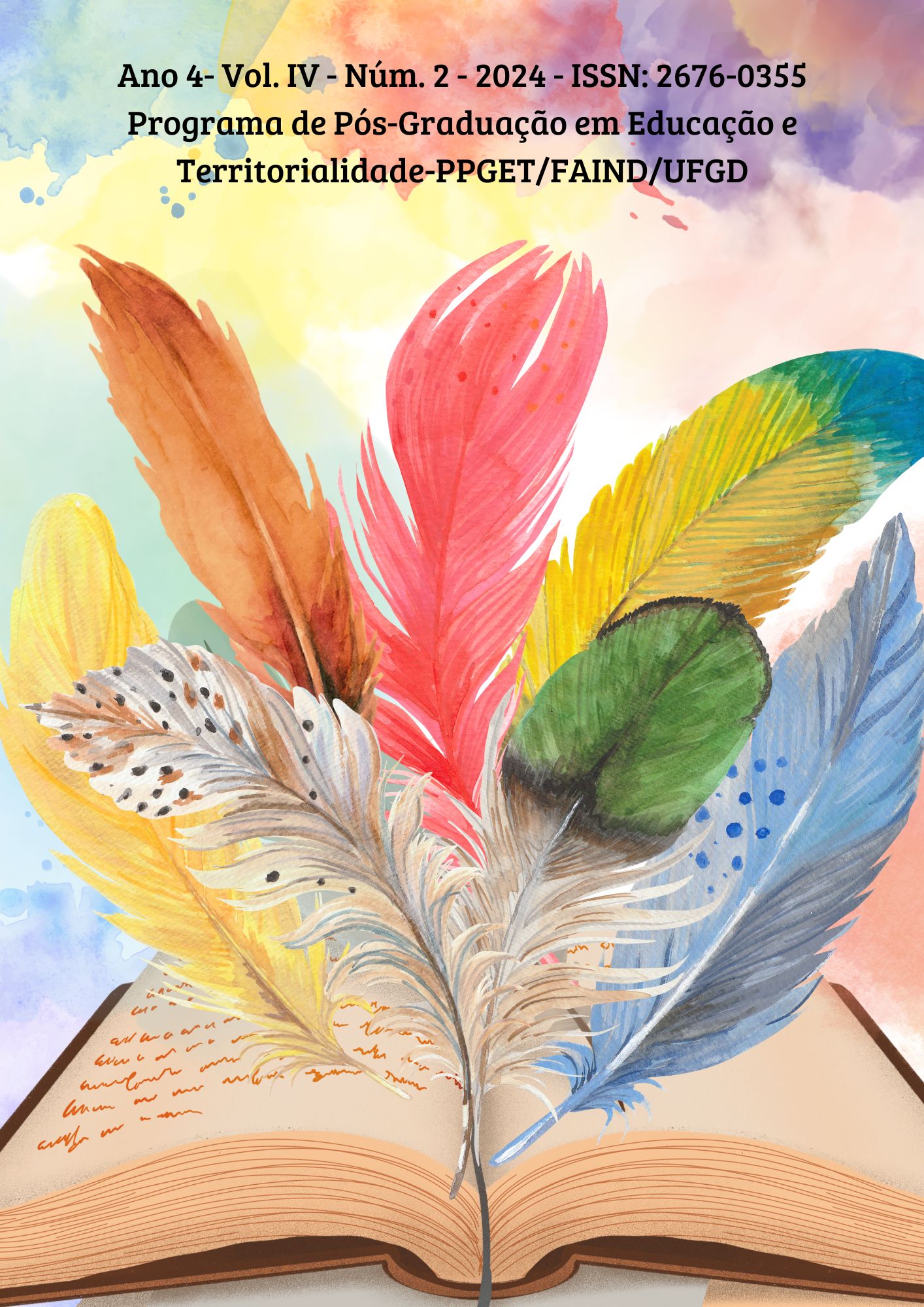Cultural Intersections in Mathematics Education: the experience of an Ethnomathematics exhibition in a school
DOI:
https://doi.org/10.30612/riet.v4i2.18198Keywords:
Ethnomathematics, Cultural Exhibition, Mathematics Education, Pedagogical Residency ProjectAbstract
The aim of this article is to report on the experience of a resident of the Pedagogical Residency Program of the State University of Montes Claros in an exhibition of a Cultural Fair in a public school in the municipality of Montes Claros - Minas Gerais, showing practices, games and exhibitions with the theme of Ethnomathematics. This experience report was based on the theoretical assumptions of Brazilian researcher Ubiratan D'Ambrosio. As a result, it was possible to explore various facets of Ethnomathematics to engage and stimulate students, showing a more humanized mathematics, enabling a more meaningful and broader understanding of the discipline, beyond four walls. It was also possible to conclude that Ethnomathematics produced excellent results among the students, as it is an approach that brings a number of important considerations that deserve to be taken into account, including recognizing diversity, connecting with real life, promoting inclusion, deconstructing ethnic and educational stereotypes, interdisciplinary integration, respect for cultures and stimulating curiosity.
Downloads
References
BRANDÃO DIOGENES, Adriana Lúcia; SANTOS FERREIRA, Graziele. O jogo Mancala como estratégia pedagógica Etnomatemática: relato de uma experiência numa turma de 2º ano do Ensino Fundamental da Escola Estadual “Professor Elídio Duque no município de Salinas-MG. Em Tempo de Histórias, v. 1, n. 36, 2020. DOI: 10.26512/emtempos.v1i36.31727.
BRETON, Hervé; ALVES, Camila Aloisio. A narração da experiência vivida face ao “problema difícil” da experiência: entre memória passiva e historicidade. Revista Práxis Educacional, Vitória da Conquista, v. 17, n. 44, p. 1-14, jan./mar., 2021. DOI: 10.22481/praxisedu.v17i44.8013.
CONVENTO CRISTO. O Jogo Alquerque de 12, [s.d.]. Jogos. Disponível em: <http://www.conventocristo.gov.pt/data/Documentos/SEA/O%20JOGO%20do%20Alquerque.pdf>. Acesso em: 9 dez. 2023.
BUENO; Monia Andreia Tomieiro. Código e arte: a Etnomatemática dos Incas, 2002. Etnomatemática. Disponível em: <https://chacoindigena.net/wp-content/uploads/2020/07/MTomieiro-Etnomatematica.pdf>. Acesso em: 9 dez. 2023.
D’AMBROSIO, Ubiratan. Etnomatemática: Arte ou Técnica de explicar e conhecer. São Paulo: Ática, 1990.
D’AMBROSIO, Ubiratan. Da realidade à ação: reflexões sobre educação e matemática. 2. ed. São Paulo: Sumus, 1996.
D’AMBROSIO, Ubiratan. Educação para uma sociedade em transição. Campinas, SP: Papirus, 1999.
D’AMBRÓSIO, Ubiratan. O programa Etnomatemático: Uma síntese. Acta Scientiae, v. 10, n. 1, jan/jun. 2008.
D’AMBROSIO, Ubiratan. Etnomatemática e educação. In: KNIJNIK, G., WANDERER, F. & OLIVEIRA, C. J. Etnomatemática, currículo e formação de professores. Santa Cruz do Sul: Editora da Unisc, p. 39-52, 2010.
DIOGENES, Adriana Lúcia Brandão; ALMEIDA, Shirley Patrícia Nogueira de Castro e. Integração e diversidade: articulações entre a Etnomatemática e as questões étnico-raciais. Revista de Ensino de Ciências e Matemática, v. 14, n. 2, p. 1–23, 2023. DOI: 10.26843/rencima.v14n2a12.
LUDOSOFIA. Jogo milenar, Xiangqi revela-se mais que simples xadrez chinês, 2021. Arqueologia. Disponível em: <https://ludosofia.com.br/wp-content/uploads/2021/07/xiangqi_para_imprimir.pdf>. Acesso em: 9 dez. 2023.
MENEZES, Edmilson. Método e limites da razão em Kant: enfoques preliminares. Cenas Educacionais, v. 4, p. e11425, 2021. Disponível em: https://revistas.uneb.br/index.php/cenaseducacionais/article/view/11425. Acesso em: 9 dez. 2023.
MUSSI, Ricardo Fraklin de Freitas; FLORES, Fabio Fernandes; ALMEIDA, Cláudio Bispo de. Pressupostos para a elaboração de relato de experiência como conhecimento científico. Práxis Educacional, Vitória da Conquista, v. 17, n. 48, p. 60-77, 2021. DOI: 10.22481/praxisedu.v17i48.9010.
OLIVEIRA, Saulo Macedo de. A Educação Matemática Crítica em uma turma do “Novo” Ensino Médio. Revista de Investigação e Divulgação em Educação Matemática, v. 8, n. 1, 2024. DOI: 10.34019/2594-4673.2024.v8.43811.
OLIVEIRA, Saulo Macedo de. A Gincana Matemática como metodologia de ensino e aprendizagem: um Relato de Experiência à luz das teorias da Aprendizagem Significativa e Experiencial. Revista Multidisciplinar do Vale do Jequitinhonha - ReviVale, Instituto Federal do Norte de Minas Gerais - Campus Aracuai, v. 3, n. 2, p. 1–15, 2023. DOI: 10.56386/2764-300x2023224.
OLIVEIRA, Saulo Macedo de; LOPES, Rieuse. O Júri Simulado como metodologia ativa no curso de Licenciatura em Matemática. Educação Matemática Debate, Montes Claros, v. 7, n. 13, p. 1–17, 2023. DOI: 10.46551/emd.v7n13a13.
TARDIF, Maurice. Saberes docentes e formação profissional. Rio de Janeiro: Vozes, 2002.
Downloads
Published
How to Cite
Issue
Section
License
Copyright (c) 2024 Revista Interdisciplinar em Educação e Territorialidade – RIET

This work is licensed under a Creative Commons Attribution-NonCommercial 3.0 Unported License.
Os autores devem aceitar as normas de publicação ao submeterem a revista.
Os artigos publicados passam a ser propriedade da revista.
Autores que publicam neste periódico concordam com os seguintes termos:
(a) O Conselho Editorial se reserva ao direito de efetuar, nos originais, alterações da Língua portuguesa para se manter o padrão culto da língua, respeitando, porém, o estilo dos autores.
(b) Autores mantém os direitos autorais e concedem à revista o direito de primeira publicação, com o trabalho simultaneamente licenciado sob a Licença Creative Commons Attribution que permite o compartilhamento do trabalho com reconhecimento da autoria e publicação inicial nesta revista.
(c) Autores têm autorização para assumir contratos adicionais separadamente, para distribuição não-exclusiva da versão do trabalho publicada nesta revista, exemplo: publicar em repositório institucional ou como capítulo de livro, com reconhecimento de autoria e publicação inicial nesta revista.
(d) Autores têm permissão e são estimulados a publicar e distribuir seu trabalho online – em repositórios institucionais, página pessoal, rede social ou demais sites de divulgação científica.

